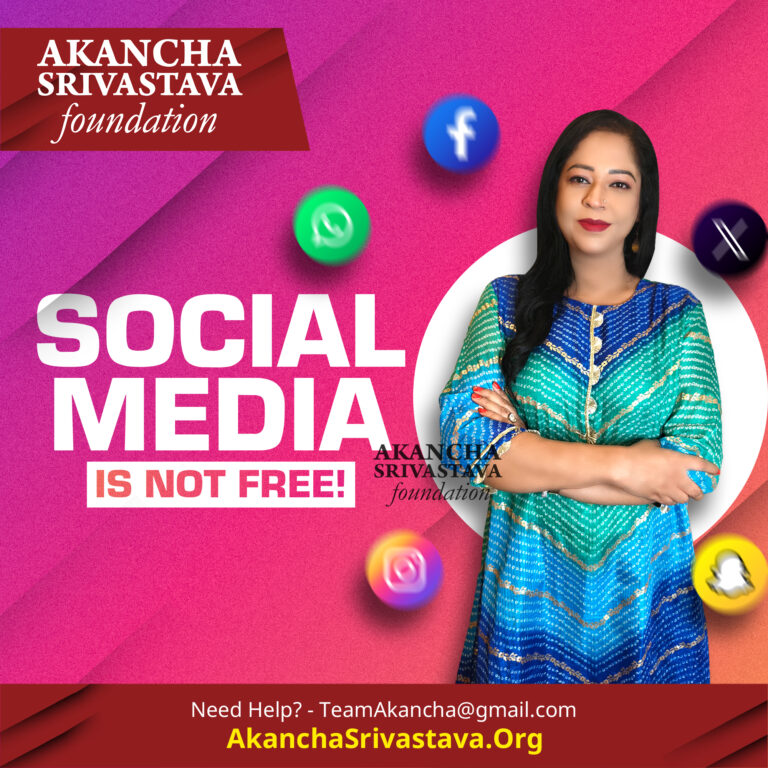Think before your next post online!
Social media platforms like Facebook, WhatsApp, and Instagram appear free but come at an enormous hidden cost—our personal data, digital habits, and behavioral patterns are constantly harvested, analyzed, and monetized. This data collection is far more invasive than most realize. It is not just about targeted ads; these platforms trade and commodify our digital DNA, shaping our choices, influencing thoughts, and exposing users to unprecedented risks. The dangers are explored in documentaries like The Social Dilemma, which reveal how these platforms manipulate users for profit, often at the cost of mental health, privacy, and democracy.
What Data is Collected and Why It Matters
- Platforms access personal information such as name, age, and gender.
- Location tracking is continuous, even when apps are inactive.
- Contact lists and social connections are uploaded and analyzed.
- Access to media libraries, including photos and videos, allows deeper profiling.
- Microphone and camera permissions enable passive data collection, sometimes without explicit user knowledge.
- Browsing history beyond social media apps is tracked through embedded trackers and cookies.
- Purchase data, both on and off platform, is aggregated to predict buying behavior.
Real-World Impact
- The Social Dilemma (2020) reveals how addictive social media platforms cause increased anxiety, depression, and social polarization, especially among youth.
- Excessive use correlates with mental health disorders and reduced cognitive ability.
- Facebook faced multiple data breaches exposing millions of users worldwide, compromising privacy on a massive scale.
- Mark Zuckerberg and Facebook have been under intense legal scrutiny and ongoing trials related to privacy violations, misinformation, and monopoly practices. Recent hearings continue to challenge Facebook’s role in data misuse and user manipulation.
- Social media data is exploited by cybercriminals and foreign actors for identity theft, misinformation, and targeted harassment.
The Cambridge Analytica Case Study
One of the most significant examples of data misuse is the Cambridge Analytica scandal. In 2018, it was revealed that Cambridge Analytica, a political consulting firm, harvested data from millions of Facebook users without their consent. This data was used to create detailed psychological profiles to target voters with personalized political advertisements during elections, notably the 2016 US presidential election and the Brexit referendum. The scandal exposed how social media data could be weaponized to manipulate democratic processes, erode public trust, and polarize societies. The fallout led to global calls for stricter data privacy laws and highlighted the urgent need for transparency and accountability in how personal data is collected and used by technology companies.
PS: TikTok was the worst offender, with a privacy policy allowing extensive data collection, including biometric data and location tracking, raising serious security and privacy concerns. Fortunately, it remains banned in India due to risks of data misuse and national security threats.
Why We Are Trading Our Life DNA
- Data on behaviours, relationships, and preferences creates a unique digital fingerprint for every user.
- This “life DNA” predicts vulnerabilities, health risks, and financial behavior.
- Social networks profit not by charging users but by converting human behavior into valuable data points for sale and influence.
- The illusion of control is deceptive; most users remain unaware of the extent and consequences of data collection.
What You Must Do
- Limit data shared on social platforms and rigorously review app permissions.
- Use privacy-focused alternatives and encrypted messaging when possible.
- Regularly audit your digital footprint and adjust privacy settings accordingly.
- Educate children and young adults about the real cost of “free” social media.
- Demand transparency and regulation from social media companies and governments to protect individual rights.
Subscribe, like, and share this video to spread awareness about the hidden dangers of social media data collection. Protect yourself and your family—knowledge is power.
🔔 Subscribe for more cyber safety insights!
👍 Like, share & comment to spread awareness!
Stay Aware, Stay Safe. Jai Hind Jai Bharat.
CONTACT US:
Website: www.AkanchaSrivastava.Org
Email: TeamAkancha@gmail.com
Twitter: @AkanchaS
Instagram: @akanchas
https://www.instagram.com/akanchas/
Facebook:
https://www.facebook.com/akanchasrivastava1
LinkedIn:
https://www.linkedin.com/in/akanchasrivastava/
ABOUT ‘AKANCHA SRIVASTAVA FOUNDATION’
The Akancha Srivastava Foundation is India’s leading social impact initiative dedicated to advancing cyber safety awareness and education. Established in February 2017, this not-for-profit Section 8 organization is a trusted voice in promoting safe online practices across the nation.
Distinguished Board of Advisors
Guided by an honorary advisory board of esteemed leaders:
- Former Special DGP RK Vij (Chhattisgarh Police)
- ADG Navniet Sekera (Uttar Pradesh Police)
- ADG Krishna Prakash (Maharashtra Police)
- Dr. Poonam Verma (Principal, SSCBS, Delhi University)
Our Mission
The Foundation is committed to educating, empowering, and building bridges between the public and authorities on critical cyber safety issues. Additionally, we specialize in forensics training for law enforcement, equipping them with the skills needed to tackle cybercrime effectively.
The Foundation is committed to educating, empowering, and building bridges between the public and authorities on critical cyber safety issues. Additionally, we specialize in forensics training for law enforcement, equipping them with the skills needed to tackle cybercrime effectively.

